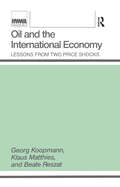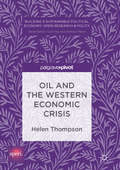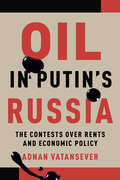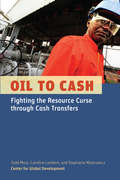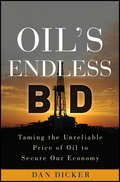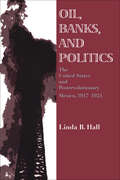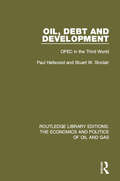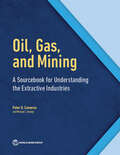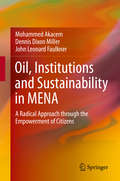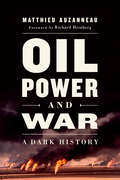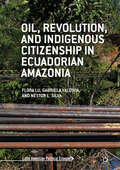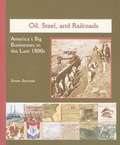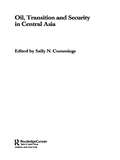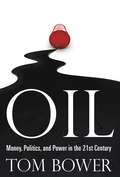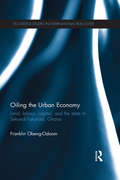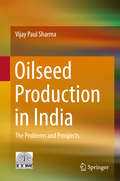- Table View
- List View
Oil and the International Economy
by Beate Reszat Georg Koopmann Klaus MatthiesThe oil price increases of the 1970s left deep marks on the world economy. They led to a massive redistribution of income in favor of oil-producing countries, and caused serious disruption of growth, imbalances in foreign trade, and problems of stability in oil-importing countries. Despite the present levelling off, the authors suggest that more price increases remain a distinct possibility.Oil and the International Economy examines the effects of rising oil prices on the international financial system and identifies ways that oil-importing countries can overcome the financial and adjustment problems caused by them. The authors project the long-term trend in real oil prices and present economic policy options to help avoid future financial problems for industrialized and developing nations alike.
Oil and the Western Economic Crisis
by Helen ThompsonThis book explains the place of oil in the economic and political predicaments that now confront the West. Thompson explains the problems that the rising cost of oil posed in the years leading up to the 2008 crash, and the difficulties that a volatile oil market now poses to economic recovery under the conditions of high debt, low growth and quantitative easing. The author argues that the 'Gordian knot' created by the economic and political dynamics of supply and demand oil in the present international economy poses a fundamental challenge to the assumption of economic progress embedded in Western democratic expectations.
Oil in Putin’s Russia: The Contests over Rents and Economic Policy
by Adnan VatanseverNo sector has been as vital as oil to the Russian economy since Vladimir Putin came to power. The longest serving leader since Stalin, Putin has presided during a period of relative economic prosperity driven largely by booming oil windfalls. Oil in Putin’s Russia offers an in-depth examination of the contests over windfalls drawn from the oil sector. Examining how the Russian leadership has guided the process of distributing these windfalls, Adnan Vatansever explores the causes behind key policy continuities and policy reversals during Putin’s tenure. The product of over ten years of research, including interviews with decision-makers and oil industry officials, Oil in Putin’s Russia takes an innovative approach to understanding the contested nature of resource rents and the policy processes that determine how they are allocated. In so doing, it offers a comprehensive and timely account of politics and policy in contemporary Russia, and a significant contribution to research on the political economy of resource rents in mineral resource-rich countries.
Oil to Cash: Fighting the Resource Curse Through Cash Transfers
by Caroline Lambert Todd Moss Stephanie MajerowiczWhat should a country do if it suddenly discovers oil and gas? How should it spend the subsequent cash windfall? How can it protect against corruption? How can citizens truly benefit from national wealth? With many of the world's poorest and most fragile states suddenly joining the ranks of oil and gas producers, these are pressing policy questions. Oil to Cash explores one option that may help avoid the so-called resource curse: just give the money directly to citizens. A universal, transparent, and regular cash transfer would not only provide a concrete benefit to regular people, but would also create powerful incentives for citizens to hold their government accountable. Oil to Cash details how and where this idea could work and how policymakers can learn from the experiences with cash transfers in places like Mexico, Mongolia, and Alaska.
Oil's Endless Bid: Taming the Unreliable Price of Oil to Secure Our Economy
by Dan DickerExpert analysis of rising oil prices and the out-of-control oil markets that jeopardize both national security and the economy The price of oil is negatively impacting both companies and consumers. <P><P>In Oil's Endless Bid: Taming the Unreliable Price of Energy to Secure Our Economy, energy analyst Dan Dicker recalls his experiences as an oil trader and reveals the changes that have taken place in the oil markets during the past twenty years, and particularly the last five, as investment banks, energy hedge funds, and managed futures funds have come to dominate energy trading and wreak havoc on prices. Reveals why oil prices cannot stabilize without dramatic action on the part of both government and business Details how the novel, but wrong, idea of oil as an asset class took a sleepy, club-like market into the national spotlight Describes how the United States is unnecessarily handing its wealth over to foreign oil producers during a time when the potential supply of oil is greater than ever Written by an industry insider, Oil's Endless Bid analyzes the biggest financial story of the last ten years?how we lost control of our oil markets.
Oil, Banks, and Politics: The United States and Postrevolutionary Mexico, 1917–1924
by Linda B. HallA study in conflict between a powerful industry and a struggling nation: “This fine monograph . . . addresses an important issue in Mexican history.” —The AmericasMexico was second only to the United States as the world’s largest oil producer in the years following the Mexican Revolution. As the revolutionary government became institutionalized, it sought to assure its control of Mexico’s oil resources through the Constitution of 1917, which returned subsoil rights to the nation. This comprehensive study explores the resulting struggle between oil producers, many of which were U.S. companies, and the Mexican government. Linda Hall goes beyond the diplomacy to look at the direct impact of a powerful, highly profitable foreign-controlled industry on a government and a nation trying to recover from a major civil war. She draws on extensive research in Mexican archives, including both government sources and the private papers of Presidents Alvaro Obregón and Plutarco Elías Calles, as well as U.S. government and private sources. In the wake of the North American Free Trade Agreement’s expansion of United States business ties to Mexico, this study of a crucial moment in U.S.-Mexican business relations will be of interest to a wide audience in business, diplomatic, and political history.
Oil, Banks, and Politics: The United States and Postrevolutionary Mexico, 1917–1924
by Linda B. HallA study in conflict between a powerful industry and a struggling nation: “This fine monograph . . . addresses an important issue in Mexican history.” —The AmericasMexico was second only to the United States as the world’s largest oil producer in the years following the Mexican Revolution. As the revolutionary government became institutionalized, it sought to assure its control of Mexico’s oil resources through the Constitution of 1917, which returned subsoil rights to the nation. This comprehensive study explores the resulting struggle between oil producers, many of which were U.S. companies, and the Mexican government. Linda Hall goes beyond the diplomacy to look at the direct impact of a powerful, highly profitable foreign-controlled industry on a government and a nation trying to recover from a major civil war. She draws on extensive research in Mexican archives, including both government sources and the private papers of Presidents Alvaro Obregón and Plutarco Elías Calles, as well as U.S. government and private sources. In the wake of the North American Free Trade Agreement’s expansion of United States business ties to Mexico, this study of a crucial moment in U.S.-Mexican business relations will be of interest to a wide audience in business, diplomatic, and political history.
Oil, Debt and Development: OPEC in the Third World (Routledge Library Editions: The Economics and Politics of Oil and Gas)
by Paul Hallwood Stuart SinclairThis book, originally published in 1981, discusses the various welfare effects – including ai, debt, trade and labour flows - of the rise in oil prices and revenues which took place in the 1970s. These complex effects and the negotiating stances of the developing countries are all examined an dinvestigated, drawing upon a wide range of sources and material for the more quantitative parts. Throughout, however, the treatment is non-mathematical and is written in clear English accessible not only to bankers and polititians, but also students of economics, international relationjs and area studies.
Oil, Democracy, and Development in Africa
by John R. HeilbrunnThis book focuses on the history, key industry and policy actors, and political economic outcomes in oil-producing African states, filling a gap in the literature on resource-abundant countries by providing an optimistic assessment of circumstances in contemporary Africa. John R. Heilbrunn's historical analysis investigates the origins of how different policy makers responded to inflows of oil windfalls. In doing so, Heilbrunn illustrates how outcomes vary as a consequence of the goals of particular actors that are distinct from the activities in their country's oil sector. This contribution calls for a reassessment of how we consider the impact of oil on developing economies.
Oil, Dollars, Debt, and Crises
by Mahmoud A. El-Gamal Amy Myers JaffeOil, Dollars, Debt, and Crises studies the causes of the current oil and global financial crisis and shows how America's and the world's growing dependence on oil has created a repeating pattern of banking, currency, and energy-price crises. Unlike other books on the current financial crisis, which have focused on U. S. indebtedness and American trade and economic policy, Oil, Dollars, Debt, and Crises shows the reader a more complex picture in which transfers of wealth to and from the Middle East result in a perfect storm of global asset and financial market bubbles, increased unrest, terrorism and geopolitical conflicts, and eventually rising costs for energy. Only by addressing long-term energy policy challenges in the West, economic development challenges in the Middle East, and the investment horizons of financial market players can policy makers ameliorate the forces that have been causing repeating global economic crises.
Oil, Gas, and Mining: A Sourcebook for Understanding the Extractive Industries
by Michael C. Stanley Peter D. CameronOil, Gas, and Mining: A Sourcebook for Understanding the Extractive Industries provides developing countries with a technical understanding and practical options around oil, gas, and mining sector development issues. A central premise of the Sourcebook is that good technical knowledge can better inform political, economic, and social choices with respect to sector development and the related risks and opportunities. The guidance provided by the Sourcebook assumes a broad set of overarching principles, all centered on good governance and directed at achieving positive and broadly based sustainable development outcomes. This Sourcebook is rich in presenting options to challenges, on the understanding that contexts and needs vary, and that there is much to be gained from appreciating the lessons learned from a broad set of experiences.
Oil, Institutions and Sustainability in MENA: A Radical Approach through the Empowerment of Citizens
by Mohammed Akacem Dennis Dixon Miller John Leonard FaulknerThis book addresses the factors that have led to the lackluster economic performance of the oil MENA region, despite the wealth of its vast natural resource. It offers a radical policy recommendation as a way out. Using data from a wide variety of sources, it analyzes the major problems that confront the governments of the MENA region, and make the case why the status quo is unsustainable. Recently, Algeria has shown that people will tire of the status quo and will demand wholesale changes. At the core of the problem of corruption, rent seeking, waste, and lack of economic diversification, is the presence of oil and its control by the state. But oil by itself should help, not hinder MENA’s economic development. While historically, oil revenues may have contributed to the maintenance of corrupt institutions and rent seeking among oil-rich nations, the mere presence of such valuable natural resources need not be the problem. It argues for a plan to empower citizens and invert the power relationship, so that the citizen’s voices matter. For the spirit of the Arab Spring to be successful, the region must adopt significant institutional changes that embrace the rule of law, transparency, democratic accountability, and the protection of human and private rights.
Oil, Power, and War: A Dark History
by Matthieu AuzanneauCatholic Herald Book Awards 2019 Finalist, Current Affairs&“Auzanneau has created a towering telling of a dark and dangerous addiction.&”—NatureThe story of oil is one of hubris, fortune, betrayal, and destruction. It is the story of a resource that has been undeniably central to the creation of our modern culture, and ever-present during the darkest exploits of empire the world over. For the past 150 years, oil has become the most essential ingredient for economic, military, and political power. And it has brought us to our present moment in which political leaders and the fossil-fuel industry consider extraordinary, and extraordinarily dangerous, policy on a world stage marked by shifting power bases.Upending the conventional wisdom by crafting a &“people&’s history,&” award-winning journalist Matthieu Auzanneau deftly traces how oil became a national and then global addiction, outlines the enormous consequences of that addiction, sheds new light on major historical and contemporary figures, and raises new questions about stories we thought we knew well: What really sparked the oil crises in the 1970s, the shift away from the gold standard at Bretton Woods, or even the financial crash of 2008? How has oil shaped the events that have defined our times: two world wars, the Cold War, the Great Depression, ongoing wars in the Middle East, the advent of neoliberalism, and the Great Recession, among them?With brutal clarity, Oil, Power, and War exposes the heavy hand oil has had in all of our lives—and illustrates how much heavier that hand could get during the increasingly desperate race to control the last of the world&’s easily and cheaply extractable reserves.
Oil, Revolution, and Indigenous Citizenship in Ecuadorian Amazonia
by Gabriela Valdivia Flora Lu Néstor L. SilvaThis book addresses the political ecology of the Ecuadorian petro-state since the turn of the century and contextualizes state-civil society relations in contemporary Ecuador to produce an analysis of oil and Revolution in twenty-first century Latin America. Ecuador's recent history is marked by changes in state-citizen relations: the election of political firebrand, Rafael Correa; a new constitution recognizing the value of pluriculturality and nature's rights; and new rules for distributing state oil revenues. One of the most emblematic projects at this time is the Correa administration's Revoluci#65533;n Ciudadana, an oil-funded project of social investment and infrastructural development that claims to blaze a responsible and responsive path towards wellbeing for all Ecuadorians. The contributors to this book examine the key interventions of the recent political revolution--the investment of oil revenues into public works in Amazonia and across Ecuador; an initiative to keep oil underground; and the protection of the country's most marginalized peoples--to illustrate how new forms of citizenship are required and forged. Through a focus on Amazonia and the Waorani, this book analyzes the burdens and opportunities created by oil-financed social and environmental change, and how these alter life in Amazonian extraction sites and across Ecuador.
Oil, Steel, and Railroads: America's Big Businesses in the Late 1800s (America's Industrial Society in the 19th Century Ser.)
by Jesse JarnowExamines the history of business in the United States during the 1800s, discussing the growth of railroads, and the innovations in the oil and steel industries.
Oil, Transition and Security in Central Asia
by Sally CummingsApproaching Central Asia from the perspective of geopolitics, transition, oil and stability, the authors provide a very broad and diverse analysis of the region, examining domestic and international developments since 1991. The book both provides an introduction to the region and presents advanced research on international pipeline projects, political risk and developments after September 11th. The authors draw on a variety of disciplines, including economics, politics, international relations, law and sociology.
Oil: A Beginner's Guide (Beginner's Guides)
by Vaclav SmilWorld acclaimed scientist Vaclav Smil reveals everything there is to know about nature's most sought-after resourceOil is the lifeblood of the modern world. Without it, there would be no planes, no plastic, no exotic produce, and a global political landscape few would recognise. Humanity&’s dependence upon oil looks set to continue for decades to come, but what is it? Fully updated and packed with fascinating facts to fuel dinner party debate, Professor Vaclav Smil's Oil: A Beginner's Guide explains all matters related to the &‘black stuff&’, from its discovery in the earth right through to the controversy that surrounds it today.
Oil: History, Present and Future
by Jurgen WeissThis background note is intended to provide context for a discussion of the strategies for big integrated oil companies in light of both oil's current role in the global energy system and the uncertainty about changes going forward.
Oil: Money, Politics, and Power in the 21st Century
by Tom BowerA groundbreaking, in-depth, and authoritative twenty-year history of the hunt and speculation for our most vital natural resource. OIL Money, Politics, and Power in the 21st Century Twenty years ago oil cost about $7 a barrel. In 2008 the price soared to $148 and then fell to below $40. In the midst of this extraordinary volatility, the major oil conglomerates still spent over a trillion dollars in an increasingly frantic search for more. The story of oil is a story of high stakes and extreme risk. It is the story of the crushing rivalries between men and women exploring for oil five miles beneath the sea, battling for control of the world's biggest corporations, and gambling billions of dollars twenty-four hours every day on oil's prices. It is the story of corporate chieftains in Dallas and London, traders in New York, oil-oligarchs in Moscow, and globe-trotting politicians-all maneuvering for power. With the world as his canvas, acclaimed investigative reporter Tom Bower gathers unprecedented firsthand information from hundreds of sources to give readers the definitive, untold modern history of oil . . . the ultimate story of arrogance, intrigue, and greed.
Oiling the Urban Economy: Land, Labour, Capital, and the State in Sekondi-Takoradi, Ghana (Routledge Studies in International Real Estate)
by Franklin Obeng-OdoomThis book presents a critical analysis of the ‘resource curse’ doctrine and a review of the international evidence on oil and urban development to examine the role of oil on property development and rights in West Africa’s new oil metropolis - Sekondi-Takoradi, Ghana. It seeks answers to the following questions: In what ways did the city come into existence? What changes to property rights are oil prospecting, explorations, and production introducing in the 21st century? How do the effects vary across different social classes and spectrums? To what extent are local and national institutions able to shape, restrain, and constrain trans-national oil-related accumulation and its effects on property in land, property in housing (residential, leisure, and commercial), and property in labour? How do these processes connect with the entire urban system in Ghana? This book shows how institutions of varying degrees of power interact to govern land, housing, and labour in the city, and analyses how efficient, sustainable, and equitable the outcomes of these interactions are. It is a comprehensive account of the tensions and contradictions in the main sectors of the urban economy, society, and environment in the booming Oil City and will be of interest to urban economists, development economists, real estate economists, Africanists and urbanists.
Oilseed Production in India
by Vijay Paul SharmaThis book analyses the performance and potential of India's oilseed sector, identifies the major constraints facing the industry and suggests options for increasing the country's oilseed production and productivity, taking into account the changing policy environment, increasing demand, slow growth in domestic production and rising imports. India as the world's largest producer of oilseeds, accounts for about 7-8 per cent of global vegetable oil production. However, the growth in domestic production has not kept pace with the growth in demand. Low yields and high production and market risks due to lack of irrigation facilities and effective risk management have been responsible for widening the demand-supply gap over the years, and the country now imports more than half of its oilseed for domestic consumption. The Technology Mission on Oilseeds (TMO), launched in the mid-1980s, helped achieve self-sufficiency in edible oil production through the spread of technology and the provision of market support. However, increasing demand for edible oils necessitated imports in large quantities, leading to a substantial drain on foreign exchange. Given the competing demands on agricultural land from various crops and enterprises, the production of oilseeds can be increased only if productivity is improved significantly and farmers receive remunerative prices and have assured market access. However, farmers face various constraints in oilseed production; several biotic, abiotic, technological, institutional and socio-economic constraints inhibit exploitation of the full yield potential of crops, which need to be addressed. The book explores these issues using data collected from about 2,000 oilseed growers: 490 soybean farmers, 316 rapeseed-mustard growers, 470 groundnut farmers, 250 sesamum farmers and 470 sunflower growers from selected Indian states. It would be of immense use for scholars and policy makers alike who are working in this field.
Olam International
by David E. Bell Mary ShelmanIn 20 years, Sunny Verghese had built Singapore-based Olam International from a small Nigerian export company into a $5 billion global leader in agricultural commodities with a core competence in Africa. Olam's growth had come by pursuing product and geographic adjacencies and its 'farm gate to factory gate' approach had been extended to 14 agricultural products, including cashews, sesame, cocoa, and coffee. In mid-October 2008, Olam's stock price declined to $1 a share from a high of $3.71 in early 2007 as part of the global economic crisis. Verghese had to decide whether to change the firm's strategy based on the new economic environment.
Olam: Building a Sustainable Supply Chain in Cote d'Ivoire
by V. Kasturi Rangan Nina Ann GeorgeDescribes Olam's development of a sustainable cotton supply chain in Cote d'Ivoire, West Africa. Key dilemma for its managers: feasibility of introducing tractor technology for improving yield.
Olam: Building a Sustainable Supply Chain in Cote d'Ivoire
by V. Kasturi Rangan Nina Ann GeorgeDescribes Olam's development of a sustainable cotton supply chain in Cote d'Ivoire, West Africa. Key dilemma for its managers: feasibility of introducing tractor technology for improving yield.
Old Age for Beginners: Hilarious Life Advice for the Newly Ancient
by Clive WhichelowThere’s no denying it – you’re OLD, but that comes with a lot of perks. You can get away with saying the most outrageous things. You can dress however you damn well please. And after learning from all your mistakes, you’re now as wise as you are wizened. It’s your time to recline, and this hilarious book will show you how it’s done.
